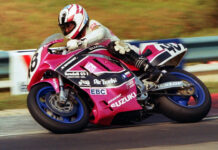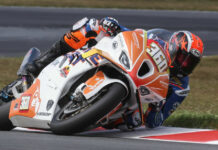The AMA issued a February 20 press release headlined “Mehl To Consult AMA Pro Racing On Rules Making Procedures.” The release read:
“Leo Mehl, a leading figure in motorsports for over 40 years, will consult AMA Pro Racing in developing procedures for applying rules changes and formulating new rules. Mehl headed the Goodyear Tire & Rubber Company’s Worldwide Racing Division for over 20 years, and recently retired as Vice President of the Indianapolis Motor Speedway and Executive Director of the Indy Racing League.
“Mehl will study the current procedures of rules making used by AMA Pro Racing and report on ways he believes the sanctioning body can improve the process, including allowing participant input where more dialog can take place before a major rule is altered.
“‘It’s important to have someone of Leo Mehl’s stature and experience coming on board to help AMA Pro Racing update its rules making procedures,’ said AMA Pro Racing’s CEO Scott Hollingsworth. ‘Our goal is to create better understanding among everyone involved in AMA Pro Racing as to what our goals are before a change is made. Mehl’s knowledge in this area should help us reach our objectives.’
“During Mehl’s tenure at Goodyear he was a friend to motorcycle racing. Goodyear was a leading maker of motorcycle tires through the 1980s. Even after the company changed directions and got out of the motorcycle consumer market Goodyear continued to manufacture its popular dirt-track tires, which are still used today.
“Mehl, 64, joined Goodyear as a trainee in June of 1959 after graduating from the West Virginia University. A chemical engineer, he moved to Goodyear’s racing department in 1963 and helped develop the tires that put A.J. Foyt and Goodyear back into the winners’ circle in the 1967 Indianapolis 500. In 1974 Mehl was promoted to Goodyear’s director of racing. While at Goodyear Mehl worked closely with nearly all motorsports sanctioning bodies including the FIA (Formula One), NASCAR, NHRA, CART and the AMA.
“After retiring from Goodyear Mehl became the executive director of the Indy Racing League. He oversaw the day-to-day operations of the IRL during a period of significant growth and innovation. Mehl has won numerous awards and citations during his career, including being named the inaugural winner of the Motorsports Hall of Fame Heritage Award in 1993. The AMA presented Mehl with an MVP Award in 1996.
“For immediate post-race results, rider information, AMA Pro Racing notes and news, log on to www.amaproracing.com.”
The release came in the wake of recent strong criticism of AMA Pro Racing’s rules-making procedures, in which poorly-thought-out rules are changed or issued with no warning and no opportunity for affected riders and teams to comment beforehand.
Recent examples of rules being issued and then being modified in the face of an outcry from affected riders and teams include a rule prohibiting the use of powered quick-lift stands during pit stops (implementation delayed one year due to factory team objections) and a rule setting a minimum weight for all Pro Thunder-eligible machines (abandoned after it became evident that it would eliminate all machines except the Ducati 748 and certain works Buells). An example of a rule being issued and not being modified or retracted in the face of rider and team outcry is the mandate that Ducati 748s be limited to 750cc in 2001 instead of the 800cc allowed in 2000, the announcement made so late in the calendar year (first week of December) that many riders had already spent about $4000 (each) to build new 800cc engines in preparation for the 2001 season.
Racing observers remain amazed that AMA Pro Racing could not figure out how to develop a rational rules-making procedure without calling in an outside consultant. A rational rules-making process could be summarized as:
1. Identify need for new rule.
2. Do research and collect input on proposed rule.
3. Analyze research and input, modify or abandon proposed rule, as justified.
4. Publish proposed rule if research and input support its enactment.
5. Allow additional input for 30-day period.
6. Analyze additional input and modify proposed rule as needed.
7. Publish final rule.






